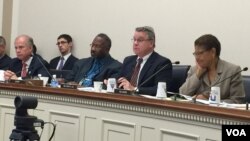Divisions rocking the opposition movement in Zimbabwe are negating efforts to bring about a democratic transition the country so desperately needs.
That from U.S. Congressman Chris Smith, chairman of the Subcommittee on Africa, Global Health, Global Human Rights and International Organizations.
Speaking during and after a Congressional hearing on the future of U.S.-Zimbabwe relations last Wednesday, Mr. Smith said Washington was concerned the opposition had become extremely weakened by infighting.
Opposition forces, the Congressman said, must close ranks and speak with one voice for the advancement of democracy and political change.
“…we are hoping that the opposition will speak out, solidify; come to a joint vision for Zimbabwe because the people deserve better than what they have now,” Smith told VOA Studio 7.
“The people deserve a real democracy… Zimbabwe has a great future.”
The Congressman was quick though to say the U.S. does not prefer any one political formation, adding that a divided opposition puts Washington in an awkward position.
“It does put the U.S. in a difficult situation, we don’t pick winners and losers, we just don’t. It’s up to the people of Zimbabwe to do that.
“But we hope that people who really espouse to true human rights observance will be smart and solidify, rally and become a real potent force,” Smith added.
He emphasized Washington’s irritation with President Robert Mugabe’s leadership, and said the country will continue engaging and planning for a post-Mugabe era.
“A leader nearing the century mark, presiding over a fractious political scene in a country that has experienced political and economic turmoil creates a situation in which planning for a positive outcome to regime change must be devised,” Smith told the Congressional hearing.
“Zimbabwe is a country rich in both natural and human potential. Once the resentment of the current old guard have passed and democratic governance can be established, U.S.-Zimbabwe relations can become what they have never been: harmonious and mutually beneficial.”
The U.S. hearing on Zimbabwe was addressed, among others, by U.S. Deputy Assistant Secretary of State for African affairs, Dr. Shannon Smith following her visit to Harare three weeks ago.
She also spoke about the Zimbabwe opposition, observing that the MDC had splintered into "multiple Movements for Democratic Change."
“It’s a fact and on record now that the opposition has been splintering. The Movement for Democratic Change now has multiple Movements for Democratic Change within it under separate leadership,” Dr. Smith told the hearing.
“Some of that is about differences of opinion, differences of leadership but I think that what is happening is that there is no unifying message at the moment that stretches across these parties.
“Certainly young people told us they were looking for a more unifying message across the opposition and for a vision where someone would take their country beyond the partisan questions themselves,” Dr. Smith said.
She told the panel that the political and human rights situation in Harare had not yet improved to warrant a normalization of bilateral ties between the two countries, whose have remained estranged for more than a decade.
Once seen as Zimbabwe’s promising opposition, the MDC has over the past years splintered into several formations, making the movement to dislodge Zanu PF from power the more difficult.
Political analyst Brilliant Mhlanga agreed with Mr. Smith, but said such comments from U.S. authorities only give Zanu PF ground to bolster its narrative of Washington’s alleged interference in Zimbabwe.
“We have said it before that the opposition must try to find a kind of coalescence of effort, meeting ground,” Mhlanga said.
“But then the other problem that a critical mind should ask regards the interest that America has in sounding so worried about this situation.”
Zanu PF-leaning analyst Morris Ngwenya observed that divisions in the opposition are warranted as the parties are pushing a foreign agenda to remove Mugabe from office.
Coalition efforts among various opposition parties have previously failed due to what some analysts are calling selfish reasons.




